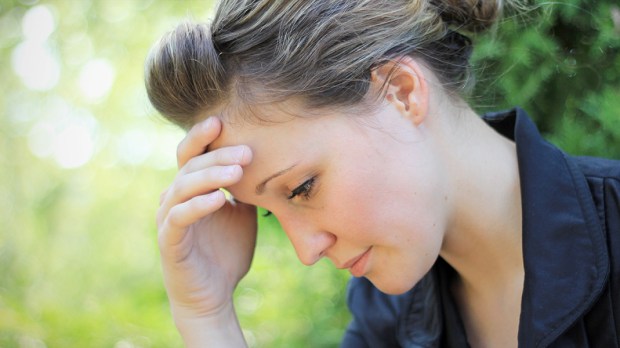Of all the mental health concerns out there today, evidence suggests that in the U.S. anxiety is the number one psychological complaint in kids and adults.
And, yes, that’s trumping a lot of other big mental issues. For example, The 2013 Global Disease Burden Study, declared that “mental and substance use disorders are the leading cause of nonfatal illness worldwide, with a global disease burden that trumps that of HIV/Aids, tuberculosis, diabetes, or transport illnesses.” Those stats are certainly worth worrying about. Especially when you consider that the the National Institute of Mental Health conducted large surveys in 2001 and 2003 of randomly selected adults and found that 46 percent of those people met criteria for at least one mental illness in their lives.
And the burden only seems to be getting worse, as more recent studies indicate that psychological difficulties have risen significantly over the past half century or more.

Read more:
10 easy, everyday ways to be more optimistic
But despite all those scary numbers, there are many ways that our children are safer than ever before. Since 1970, infant mortality has dropped significantly. Since 1907, the mortality rate of young children has dropped almost 50- fold. In the last 40 years, the rates of violent crime against children have decreased by over 60 percent. Talk about some positive statistics.
So why is it that we (both adults and children) are more anxious than ever before? Why are we suffering from severe worry and mental distress? I’ve thought hard about this paradox, and I believe there are five major societal trends that provide answers to our unnerved state of living:
The double M threat: Media and mobile devices
A plethora of information indicates that media and mobile device consumption is strongly correlated with many psychological issues, including anxiety, yet the usage rates in both areas have only increased over the past decades. That translates into a simple reality: The more our youth are linked into a screen, the more likely they are to worry.
Read more:
In Defense of Screen Time
This is especially true with early screen exposure, as kids brains lack the neurological development and life experiences to buffer the scary and confusing messages they receive through it. My advice? Don’t give your grade schoolers their own hand held devices (as tempting as it may be for plane travel and car rides) and make sure that at least two days a week (other than homework requirements), they go screen free.
Sleep woes
Evidence suggests that Americans are sleeping 20 percent less than we were just a century ago. Yet research repeatedly finds that sleep is connected to almost, well, everything. Anxiety is no exception. Roughly 90 percent of people with anxiety disorders report sleep-related problems, and no doubt that sleep and anxiety are very closely connected. If we want to improve our children’s sleep (now and for the lifespan), removing all screens from the bedroom and making sure pre-pubescent children go to bed by 9 p.m. will make the biggest difference. Click here for more sleep tips.
As the body goes, so goes the mind
In the United States, the prevalence of pediatric obesity has more than tripled during the past four decades. Our kids are eating more and moving less. Meanwhile, studies have consistently linked mental health to fitness, and it appears that processed foods especially are one of the culprits of poor health. Many recommendations abound, but three of the most important include the following: Make sure your child drinks more water than any other beverage; 30 minutes of physical activity (just half the recommended amount) should be non-negotiable; and at least one meal a day should be all natural (consider real oatmeal, banana, walnuts, and even add a little sugar for an easy weekday breakfast).
Read more:
3 easy, healthy breakfast recipes to energize you
Family matters
The good news is that divorce rates have largely leveled out over the past few decades compared to a significant increase into the mid 80s. But at the same time, unmarried couple households continue to rise dramatically. Kids born to cohabiting parents versus married ones have over 5 times greater risk of experiencing their parents’ separation. In 2000, according the US Census Bureau, 41 percent of all unmarried-couple households included a child under the age of 18. In 1987, it was 21 percent. Studies repeatedly find that kids living in cohabitating households are more likely to suffer from psychological difficulties, including anxiety. This topic doesn’t lend itself to easy suggestions, but rather points to the necessity of all parents in considering how important living situations and relationships are to their children’s mental health.
“There is no fear in love”
Although religion gone badly is fraught with many negative outcomes, faith, spirituality, and religion have long been a source of coping and resiliency for many people. Large-scale studies have generally indicated that faith and a strong relationship with a higher power is associated with less anxiety, greater social support, increased relational stability, less substance use, and fewer negative behaviors.
Here’s the tricky part: Much of the positive association between religion and psychological adjustment seems dependent on faith during youth, but evidence suggests that we are going to church less than ever before (and not being honest about attendance). Regular church attendance and involvement with service organizations and youth groups are two keys for reducing anxiety in kids.
Read more:
Why I'm not afraid to love my husband more than he loves me
We as parents still have a lot of influence in counteracting these five challenges. Mundane and courageous decisions alike are needed to put health and family stability at the forefront. It is said that “do not be afraid” (or a variant) is the most repeated phrase in the Bible. But the trends of today are not making it easy to embrace this plea. Because if I added a #6 to this list it would be parental anxiety. If we as parents are excessively anxious, our children will likely be, too. So maybe the most important recommendation I could make is to address adult anxiety first, so parents can better help their kids deal with it, too.
As I write this article, I am a day away from turning 40 and a few contractions away from our 7th child. The more blessings that come my way, the more I could be afraid of all the things that could go wrong. But I have no doubt that you and I were not bestowed with life to worry it all away. I am reminded of Philippians 4:6:
“Do not be anxious about anything, but in everything, by prayer and petition, with thanksgiving, present your requests to God.”

